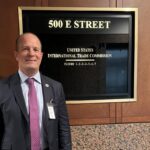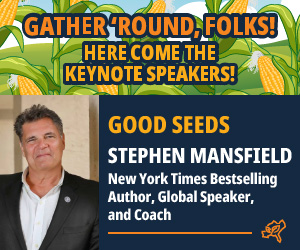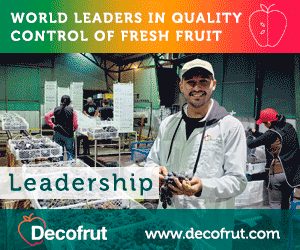Opinion: After coronavirus, the time may be right to look at PMA/United merger once again

From the pages of Jim Prevor's Perishable Pundit
Over the years, we’ve written hundreds of pages regarding the unusual situation of the produce industry having two national associations. Here are several columns we ran in PRODUCE BUSINESS magazine on the subject:
Merger Begs Question of Compatibility
Industry Concerns Should Trump Association Concerns In Merger Talk
Could Texas Association’s Realignment Suggest A New Direction For PMA/United Talks?
Here in the Pundit, we have written even more. You can see many of the pieces that referenced this issue here (in chronological order starting in 2006, with a few lapses in years as the topic seemed to die down and rejuvenate over time within the industry):
After a lull of many years, it was after the PMA convention in San Diego in the fall of 2006 that we first heard demands for a merger of PMA and United, motivated by a sense that the industry needed to present one voice on food safety issues. We discussed this issue in PMA/United Merger Fresh On Our Minds.
Next we heard commentary from Harris Cutler of Race-West Corporation and from Richard Kaiser of The Richard Kaiser Company as well as from Bob Davis of Maine Farmers Exchange. We put all these thoughts together in Pundit’s Mailbag — Should PMA and United Merge?
In PMA/United Merger-Mention Stirs Emotions, we heard the thoughtful voice of John McClung of the Texas Produce Association as he weighed on the subject based on his many years of experience with government relations efforts.
Lorri Koster of Mann Packing Company, Chuck Zambito of Zambito Produce Sales and and Jerry Van Solkema of Van Solkema Produce, Inc all added to our understanding of the issues by contributing to Pundit’s Mailbag — More On PMA/United Merger.
Tom Stenzel, President and CEO of United Fresh Produce Association, voiced his confidence in the ability of the boards of the respective associations to make a wise decision for the industry in Pundit’s Mailbag — United’s President/CEO Responds.
The Pundit tried to analyze a possible format for a merger in PMA/United Merger Dilemma: A Two-Track Proposal.
Then in our Pundit’s Mailbag — More on PMA/United Merger, we heard from Jim Allen, President/CEO of the New York Apple Association, who compared and contrasted the two associations.
Then we heard from John R. Baillie of Jack T. Baillie Co., Baillie Family Farms and Tri-County Packing, whose letter, focusing on effective policy advocacy, was featured in Pundit’s Mailbag — One-Voice Plea On PMA/United Merger Issue.
Dan’l Mackey Almy of DMA Solutions wrote us next and pointed out that one gets out of these associations whatever one puts into the associations. A thesis we reviewed in Pundit’s Mailbag — Profitable Participation.
We let the issue simmer for a while when the decision of the Western Growers Association to open a D.C. office raised issues regarding the representation of growers that struck at the core of the issues raised by a merger of United and PMA. We reviewed that in our piece entitled Pundit’s Mailbag — Bigger Picture For WGA’s DC Office.
We devoted the entire issue of July 20, 2007 to An Industry Discussion: Pros and Cons of A PMA/United Merger. In our discussion we mentioned three strong points in favor of merger and 10 strong points opposed. In doing so, we might have stumbled upon an explanation for why we have not had a merger.
Our analysis on July 20 brought a torrent of comments that we will be dealing with for some time. We printed two letters on July 24 pointing out the differences of opinion on these matters in Pundit’s Mailbag — Finding the Right Answers for Possible PMA and United Merger. Dick McKellogg of Lowe’s Food Stores told us that his primary interest is his customer, and a second letter came from a well-known industry leader who has worked the inside of this issue for some time.
The Mailbag on July 25 discussed reasons for PMA and United to remain separate with a letter from Frank McCarthy from Albert’s Organics, Pundit’s Mailbag — PMA And United Need To Remain Separate.
A United Fresh board member wrote to us on July 26. Our correspondent thought our readers might draw the conclusion that PMA performed international activities while United did not, and so sent us a letter in order to correct the record. See Pundit’s Mailbag — Getting The Facts Straight On United’s Global Outreach.
We’ve also dealt with topics that overlapped on the United/PMA merger discussion. Cool Compromise Shows Association Leadership But Battle Scars Remain was one such piece, as was another letter, which we dealt with in Pundit’s Mailbag — What Is The Best Model For industry Lobbying Efforts?
The Pundit’s Mailbag has continued to be busy. On July 31, we wrote A First-Step Suggestion for Merging PMA/United, in which Harris Cutler of Race-West Company suggested the creation of an interim group of representatives of each association to act as one cohesive voice.
Observations From Las Vegas: United Fresh Builds Momentum observed how after several years in alliance with other trade shows, United Fresh held its first solo show in six years. We were asked for meetings by several large exhibitors who told us they were spending well into the six figures to exhibit and couldn’t justify the expense. They were hoping we might bring up the possibility of merging the associations or of finding a way to have only one national show. We’ve dealt with the issue of potential merger before. Over the years the real obstacle to merger has been that many board members have great loyalty to their own association and, whichever association was doing well financially at the time, didn’t see any particular need to merge. For now, though, we have come to think of United as Daniel Webster thought of Dartmouth. He said “It is, Sir, as I have said, a small college. Yet there are those who love it.” 4/28/2009
Watch History Being Made At United In Las Vegas: Steffanie Smith Becomes First Ex-Staffer Ever To Chair The Organization; Kroger’s Reggie Griffin Is Set Up To Become First Retailer To Chair United describes how this year’s United Fresh convention and expo is filled with terrific presentations and wonderful networking opportunities. Inevitably it will bring to the fore the conversation of a possible merger between PMA and United. The forces driving a merger have not dissipated. Much as it took Nixon to go to China, it may well take a retailer to deliver a merger among the associations. 4/19/2010
Clarification: Reggie Griffin Of Kroger To Be First Retail Chairman of United — In The Modern Era explains that in the course of our earlier piece mentioning Reggie Griffin, VP of Produce Merchandising at The Kroger Company, was becoming chairman-elect of United and thus was set up to become the first retail chairman of United, We should have said of the United Fresh Produce Association or of United in the modern era. Allen Brock of Publix was chairman of the old United Fresh Fruit and Vegetable Association back in 1981, and Richard Jahnke, of Wetterau, was Chairman back in 1990. The questions raised by Reggie’s rise are two-fold: To what degree is United’s role to represent growers of produce and to what degree, if any, will having a retailer heading the association conflict with this goal? If a retailer can head United, then what, precisely, is it that prevents merger of United and PMA? 4/27/2010
In Another Move To Court Retailers, United Fresh Joins FMI And American Meat Institute To Co-Locate Event in 2012 announces that these organizations have joined forces to collocate their respective events. That means that United plans to stay in the business of doing a trade show designed to attract exhibitors who want to sell to retailers. In a time of activist government and when government lobbying has become a crucial activity, how will the produce trade finance its government relations efforts? One wonders if a deal couldn’t be struck… what if United gave up its retail-oriented event and PMA gave it some money for lobbying? 5/11/2010
PMA/United Interests Differ: Solution Offered our recent piece, In Another Move To Court Retailers, United Fresh Joins FMI And American Meat Institute To Co-Locate Event in 2012, brought this thoughtful comment from Christian Schlect, President of the Northwest Horticultural Council. Christian writes that our idea of United getting out of the retail show business in exchange for PMA funding its government relations efforts, could boil down to a matter of control. He is undeniably correct. We were suggesting something slightly different, something more akin to a sale allowing the associations separate spheres in which to operate. 5/13/2010
Pundit’s Mailbag — Clear Thinking Required On PMA/United ‘Solution’ our broad coverage of the relationship between United and PMA and, specifically, our piece, PMA/United Interests Differ: Solution Offered, brought this letter from Al Vangelos, CEO of Sun World International, and former Chairman of United, asking us to continue stimulating debate on this subject. There is no easy answer — but there are substantial reasons to look for better ways. What is clear is that we want to move while both associations are healthy so we can act, as Al Vangelos points out, methodically and thoughtfully, not out of desperation. 5/25/2010
Elephant In United’s Convention Halls: PMA-United Merger Possibilities as the industry gathers for the United Fresh convention in New Orleans, many will be discussing whether it would be a positive or a negative for the Produce Marketing Association and United Fresh to merge. It is a long-running industry controversy that strikes to the heart of what the industry would like to have its associations actually do and how the industry would like to pay for those functions. Last month in Pundit sister publication, PRODUCE BUSINESS, we dealt with the issue once more in a piece we titled, Industry Concerns Should Trump Association Concerns In Merger Talk, which we excerpt here. 5/2/2011
A PMA/UNITED MERGER IS UNDER DISCUSSION AGAIN Would It Make Government Relations More Effective? Will PMA’s Rebranding Be An Obstacle? observes how there is always a lot of hub-bub when word leaks out that PMA and United are discussing merger, and this time there is much industry support for it. There are many pros and cons to a merger proposal, but to anyone paying attention, it has been clear for some time that PMA executives have decided that whatever the future may bring, PMA will not feel constrained in its activities by any need to provide room in the marketplace for United. 10/27/2011
PMA And United: To Merge Or Not To Merge? That Is The Question quotes Bruce Peterson, who once said when assessing industry structures, “If we didn’t have the current organizational structure already set up, would we choose, today, to create this structure?” If that is the criteria by which we look at United and PMA, the answer is foreordained as it is almost surely certain that nobody would build the structures of either United or PMA the way they are today. It has simply become impossible to make a list of things that PMA does that United doesn’t and vice versa. So what, exactly, are the prime arguments for and against a merger? 6/1/2012
The United/PMA Fiasco: THE SPIN IS JUST HALF THE STORY Lessons Learned: Open Up To Industry Input And Focus On Big Things First explains that the narrative that has been promoted both on and off the record by United goes like this: The negotiations were arduous, but productive. A full agreement had been negotiated and agreed to; the only remaining issue was who should be the CEO of the newly merged association. The PMA board would not accept naming Tom as CEO; United’s board would not accept naming Bryan as CEO. There was an impasse, and the United board suggested punting the decision to the new association board to elect its own CEO. The PMA board would not acquiesce to this and thus the talks collapsed. The facts are correct, but there is a back story. 7/19/2012
Three Possible Reasons For The Collapse Of The United/PMA Merger Talks
Our recent piece on The United/PMA Fiasco brought many thoughtful letters, including this one came from a former Chairman of PMA. This epistle raises some important issues. Most notably, the narrative that has been promoted is that the two associations agreed to all components of a merger except the question of leadership. Then over the question of who ought to be CEO of the newly merged organization, the whole thing collapsed. How could United, supposedly seeing a merger as so crucial, just walk away rather than have Bryan be CEO? It makes no sense, and there are only three possibilities. 7/21/2012
An Unusual Perspective — Leader Who Has Served On Both United And PMA Boards Offers Insights On Merger Failure: HARD TO BELIEVE IT REALLY CAME DOWN TO CEO shares a letter sent in response to our recent piece on The United/PMA Fiasco from a member of a rarified fraternity — those people who have served on the Board of Directors of both United and PMA. This is a most thoughtful letter from a most engaged industry participant. He raises four important questions that explain a great deal. 7/21/2012
Pundit’s Mailbag — Putting Leadership First: Consider The Example Of The Ohio Florist’s Association mentions how David Sasuga, Founder of Fresh Origins, has been a frequent contributor to the Pundit. It turns out that in a prior life, David was in the floriculture business, and he sent us a note with an example of how an effort similar to what we were doing in produce has been done more successfully in the floral industry. 7/21/2012
Pundit’s Mailbag — Power Lies In The Pocket Book our piece on The United/PMA Fiasco brought this letter from Eric Schwartz, President & Chief Executive Officer of Patterson Vegetable Company. There is a notion in all this discussion over merger that what some of the big boys want is not so much to see the industry gain great synergy by having only one national trade association as to be saved the pain of having to make difficult decisions on their own. It would seem that what these companies are attempting through the merger process to achieve a market situation that would be more optimal for them. It is not clear, however, that this is even possible. 7/21/2012
A Modest Proposal For Reviving The Merger Of PMA And United reports how one thing that came through loud and clear at PMA’s Foodservice Conference is that many industry leaders want to see consolidation of PMA and United into one national trade association. Let us deconstruct the breakdown of the talks and lay out a specific proposal for how to resolve the issue at hand. Then, it is up to the corporate leadership of the industry to decide if they care enough about the issue of merger to insist that this proposal be adopted. 7/24/2012
United/PMA Impasse More Than Just A Decision About A CEO — It Is A Battle For The Soul Of The New Association asks why did the choice of CEO matter so much? Understanding this issue may provide a key as to whether the industry ought to proceed with a merger. Tom and Bryan are both perceived to have successfully run trade associations and there are lots of other people who have a good track record at running associations. So, why was it so important to people to have “their guy” run the new association? The answer points to a problematic issue regarding the merger agreement. It is an issue so problematic that it ought to make the industry pause for a moment and reconsider whether it makes sense to merge at all. 7/27/2012
THIRTEEN VOICES: Industry Leaders Weigh In On United/PMA Merger describes how the issue of one national trade association for the produce industry and thus possible merger between PMA and United has long haunted the produce trade. We’ve been attempting to analyze the situation and see what can and should be salvaged from this effort. Today, in our July 30, 2012 Edition, we have selected out a Baker’s Dozen of industry letters to give the trade an opportunity to speak out on this important issue. 7/30/2012
Without Change, The Question Will Not Be Who Will Survive, But Rather Can Either Survive? “A Modest Proposal” Take-2 From The Pundit shares a letter from Rick Antle, CEO and President of Tanimura & Antle. Rick is 100% correct that the mission and objectives of these associations have become blurred. The problem is that there are real reasons for the blurring. In recent days, as word of the failure of merger talks has sunk in, many in the industry have responded by saying that if we are going to have two associations, we better make sure we rationalize their structure and goals to avoid duplication and waste. With that in mind, we would like to suggest a structure that actually would work. 7/30/2012
As Association Staff Feels The Strain, Would Wall Street M&A Group Provide Quick Solution To Merger? prints a letter from a former chairman of United and experienced helmsman of several produce companies, Al Vangelos, Co-founder & Principal of Novelle Consulting, LLC. Al is very right about the danger of a drawn-out process on staff morale and retention and his idea about bringing in an investment banker is surely the way to go if you want the transaction to happen. The M&A guys could get us to the optimal business outcome, but whether it is the association the industry wants is an open question. 7/30/2012
Where’s The Face Of The Industry? Is It The Face Of A PMA Or United Executive Or A Volunteer Leader? highlights a letter from Gina Nucci, Director of Healthy Culinary Innovation at Mann Packing Co., who furthers the conversation on the United/PMA merger breakdown. Gina is a person who knows of what she speaks, and she points out that the CEO question — Bryan or Tom — really should not be the question at all. 7/30/2012
How Much Duplication Is There? prints this letter from John Pandol, Director of Special Projects at Pandol Bros., who disagrees with the claim that the two national produce organizations are duplicating efforts. We appreciate this letter, and it brings into focus four important issues in the debate over the future of United/PMA. 7/30/2012
United/PMA Merger Comes Down To Philosophy & Function our piece, United/PMA Impasse More Than Just A Decision About A CEO – It Is A Battle For The Soul Of The New Association, brought many comments including this letter from Jim Carr, President / CEO of Produce Reporter Company. Jim believes the industry does want one association, but that the philosophy and function are the unresolved issues. Indeed, saying one wants one association is fine, but the devil is in the details. This is especially so in the produce industry, where even though a representative of a foodservice operator and a grower-shipper may both agree they want one association — the one they each want is likely to be very different from the one the other wants. 7/30/2012
Neither United Nor PMA Represent Production Agriculture shows how a line in our piece, United/PMA Impasse More Than Just A Decision About A CEO — It Is A Battle For The Soul Of The New Association, caught the eye of frequent Pundit contributor Richard W. VanVranken, Agricultural Agent & County Extension Department Head at the Rutgers Cooperative Extension of Atlantic County. Richard says that his: “perception of both organizations has always been that neither had much membership from, nor understood/represented very well, the needs of production agriculture, in Washington or elsewhere.” When it comes to advocacy, it is a bit of sticky wicket. The national associations are representing the interests of many growers who are not actually members of the associations. 7/30/2012
Do We Have To Wait Another Seven To Ten Years To Make A Merger Happen? writes that to some extent, the point of all these discussions is that those who Rick Antle, in his letter, called the “ownership” don’t, in fact, have to wait another 7-10 years for this discussion to come up again. FMI killed its trade show a few years back because the CEOs of the big supermarket chains got together and said that they wanted this ended. What we are about to learn is the degree to which those who advocate for merger are willing to actually push for it. Individual companies can serve their own interests while also serving the greater industry interest, and we can do it now. Why should we falter? 7/30/2012
A CLOSER LOOK AT THE DYNAMICS THAT LED TO THE COLLAPSE OF THE UNITED/PMA MERGER: Buyer/Seller Disconnect And Consensus-builders Versus Nonconformists finds that with all the sturm and drang over the issue of merger between United and PMA, it is worth a moment to consider the role of buying organizations and the style of association board members in the industry discussions. 8/2/2012
Pundit’s Mailbag — Get It Done received this letter over the issue of merger between United and PMA encouraging bold action, and naming the person to do it, from Steve Scaroni, Founder & CEO of Valley Harvesting & Packing, Inc./Vegpacker de Mexico. If the associations had gone through the paces, and each came to the conclusion that the industry would be better off if they were separate, that would be one thing. But if the association boards are not willing to say that, industry leadership has to find an alternative solution. Use ours — no charge — or come up with another plan, but as Steve Scaroni admonishes us: “Get it Done.” 8/2/2012
Pundit’s Mailbag — Good Ol’ Fashioned Produce Candor Needed our work on the United/PMA merger issue has brought this letter from Fred Williamson, President of Andrew & Williamson who wishes that: “good ol’ fashioned produce candor had been the driving force of the negotiations.” To us, the tragedy is that both sides thought they were the court of last appeal. If stuck in an impasse, surely the right approach would be to turn to others for insight and input. It was not dishonesty but, rather, a penchant for secrecy that kept things under wraps. Of course, such closed vessels sometimes explode and make a big mess, and that is what happened in this case. 8/2/2012
Pundit’s Mailbag — ONE Global Produce Industry Needs ONE Voice shares these comments from Richard Kochersperger, Practise Leader — Education and Research at KOM International, an informed observer without any skin in the game. Richard says that: “To effectively deal with these overwhelming issues, requires ONE voice which represents the entire supply chain.” In Richard’s eyes, many of the motivations for and against merger are small, rooted in individual self-interest and concerns over particular events or programs. How small our bickering seems when one reads this letter. Maybe that is the real issue. Can we get beyond our own limitations? Perhaps coming to one association may be a win beyond our calculations. 8/2/2012
Pundit’s Mailbag — Time To Join Hands And Unite In Prayer For Success prints this spiritual response from Jim Ellis, Citrus Grower and Past Member and Director of Seald Sweet Growers Inc. We appreciate Jim’s kind words. Many, like Jim, are not involved in the day-to-day details of PMA and United, but they sense, out in the Zeitgeist, a need for consolidation. To many, it is not the budgets or numbers of trade shows. It is that the weltanschauung instructs that unity is better, essential even in these stressful times where every day seems to bring another food safety recall and so the industry is always, in some way, under attack. The desire for merger is thus a kind of prayer for unity and a beseeching of industry leadership to go beyond the temporal to the eternal. 8/2/2012
Pundit’s Mailbag — When Confronted With A United/PMA Merger Question, What Would Jesus Do? found among the many letters in response to our articles on the United/PMA Merger, was this one from Fred Williamson, President and CEO of Andrew and Williamson Fresh Produce, that brought in a reference to a well known Christian bible verse. The verse is Jesus talking to his disciples and advising them that because of his actions, his willingness to go to the cross, the temporal concerns of the world will be transcended. In sending this verse, Fred holds out the hopeful thought that the tribulations of the trade are difficult but also temporary and the result inevitable. Of course, that raises a question of leadership. 9/6/2012
Waiting For Desperation? Is It Only Necessity That Can Prompt A PMA/United Merger? opinions keep coming in on the proposed merger of PMA and United. One note came from an important east coast shipper who writes that “Some kind of pain to either organization or to both will ultimately force the merger. Until then they each have enough time, money and member support to continue independently and work toward making themselves right.” One possibility is that the industry really doesn’t want a merger. An alternative possibility is that the associations have “gone rogue.” Still another possibility is that the associations aren’t all that important to the most important players. Finally, the whole idea of merger — the idea that there is just one industry ownership — may just not be quite true. 9/20/2012
PMA Restructures Dues: New Plan Brings In More Revenue, Boosts Costs For Larger Firms, Breaks Longstanding Link Between Retail And Grower/Shipper Dues… Does PMA Need More Money? reports the Produce Marketing Association (PMA), the industry’s largest trade association, has announced a new dues structure effective for 2015. The change is being positioned as a move to make the PMA dues structure more “fair and equitable.” It probably won’t get much push-back because most of the larger companies in the industry already do some kind of extra sponsorships with PMA. But the change in structure does raise other questions. 7/23/2014
Following the collapse of the official talks over merger in 2012, the industry seemed to accept the idea of the two associations going their separate ways.
In recent days, however, we have had discussions with several industry leaders who wondered if post-pandemic — with the possibility that many in the industry will have suffered severe financial losses — it wouldn’t behoove the industry to look at the possibility of the consolidation of PMA and United.
We are not sure how far that will go. One thing that came out in the last go-round is that the associations, at least at that time, had different priorities, with United being really more focused on representing the domestic grower/shipper and wholesale sectors, especially before the US Government, whereas PMA was a more buyer-centric organization, with a more global membership.
An outgrowth of this was that it would be difficult for PMA to advocate for things that supermarket chains and/or restaurant chains might oppose because its most important members, though key buyers, were typically vice presidents and couldn’t very well advocate publicly for policies that their bosses, the CEOs of the chains, would oppose. Thus PMA has not been outspoken about things such as the PACA Trust, which is opposed by most supermarkets.
For United, its most important members were grower/shippers, and the association had the support of owners and CEOs of most of these organizations. It was, in fact, so focused on defending the position of grower/shippers that some of the most important wholesalers in the country, though multi-generational supporters of United, felt the need to set up another association, NAPAR, the National Association of Perishable Agriculture Receivers, to protect them as they felt that United would, inevitably, side with its grower/shipper membership in a conflict over PACA or other issues.

In any case, for the past several years, PMA and United had a kind of entente, and the industry seemed happy.
This year, of course, United got a tough break when its annual convention, originally scheduled for June 16-18 in San Diego, CA, had to be cancelled.
The Association rebounded, and years of work by John Toner, vice president of convention & industry relations at United, paid off as the association was ready to jump into a virtual event.
Virtual events are very different than live events. They have, of course, both advantages and disadvantages. On the pro side, many people who would never have attended because of expense and time commitment can easily go online from where they are and commit whatever amount of time they want. This is especially true in a situation such as this where United is not charging to virtually attend.
For exhibitors this might turn out to offer some new opportunities with potential buyers who had not thought the cost and time commitment of a trip worthwhile. We would guess that United will have an increase in attendance but a dramatic decrease in hours attended.
In addition, of course, in an industry as tight as ours, much of the value people get is a chance to strengthen existing relationships by sharing dinner, coffee, etc. — and this is all rather problematic in a virtual format.
In any case, it is a bit of an experiment and anyone who loves and values this industry can only hope that United finds success in this format, that industry members find value, and that on the whole United is sustained and strengthened so it can continue to serve the industry and, especially, those portions of the industry that see United as the advocate for their interests in Washington.
So, how disappointing it is to see that the PMA has decided it is desirable to conduct one of its own virtual events right in the middle of United’s annual convention.
PMA has been doing a nice job of presenting what it calls Virtual Town Halls during the pandemic. The association gets a few presenters and, in doing so, provides value to those signing on.
Just recently, on June 11th, many months after United announced its dates and times, PMA sent out a marketing piece announcing that right in the middle of the United Fresh event, PMA would hold one of these Virtual Town Halls.

It is not illegal. But it also is not what the industry wants of its associations. PMA could just as well have scheduled this for the week before or the week after or the week after that.
Over the years, there have been so many times we have avoided holding events that might weaken other produce industry institutions. This is because, in the end, we view ourselves as part of the industry, and if the industry prospers well, we always figured we would come out OK.
We’ve been proud of our association with PMA. We launched PRODUCE BUSINESS magazine at the PMA convention in 1985. On our office wall is a special commendation given to us at The PMA Board of Directors Dinner on the occasion of our 25th anniversary. We worked to write the first industry career guidance document when the Pack Family funded the development of the Pack Family/PMA Career Pathways Fund program. And of course, there have been thousands of connections over the years.
PMA is a large, successful and important produce industry organization. It doesn’t need to try to upstage other produce industry organizations that are valued by many in the industry. It is not what its membership wants.
In fact, maybe, as an industry it is time to take another look at what the industry wants. Certainly it is not funding multiple associations so they can spend the resources trying to undercut the other. Maybe in the post COVID-19 world, it would make sense to re-examine the idea of combining the national produce associations.











































